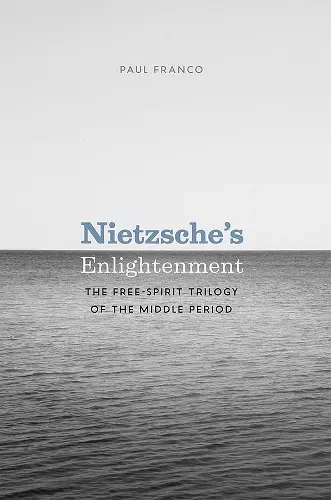Nietzsche's Enlightenment
The Free-Spirit Trilogy of the Middle Period
Format:Hardback
Publisher:The University of Chicago Press
Published:7th Oct '11
Currently unavailable, and unfortunately no date known when it will be back

While much attention has been lavished on Friedrich Nietzsche's earlier and later works, those of his so-called middle period have been generally neglected, perhaps because of their aphoristic style or perhaps because they are perceived to be inconsistent with the rest of his thought. With "Nietzsche's Enlightenment", Paul Franco gives this crucial section of Nietzsche's oeuvre its due, offering a thoughtful analysis of the three works that make up the philosopher's middle period: "Human, All too Human"; "Daybreak"; and, "The Gay Science". It is Nietzsche himself who suggests that these works are connected, saying that their "common goal is to erect a new image and ideal of the free spirit". Franco argues that in their more favorable attitude toward reason, science, and the Enlightenment, these works mark a sharp departure from Nietzsche's earlier, more romantic writings, and differ in important ways from his later, more prophetic writings, beginning with "Thus Spoke Zarathustra". The Nietzsche these works reveal is radically different from the popular image of him and even from the Nietzsche depicted in much of the secondary literature; they reveal a rational Nietzsche, one who preaches moderation instead of passionate excess and Dionysian frenzy. Franco concludes with a wide-ranging examination of Nietzsche's later works, tracking how his outlook changes from the middle period to the later and how the commitment to reason and intellectual honesty in his middle works continues to inform his final writings.
"Post-structuralists have long mined the works of Nietzsche's middle period in their efforts to employ Nietzsche as an advocate of their deconstructionist enterprise. Paul Franco shows us in a wonderful fashion why their reading is mistaken and in doing so reveals a Nietzsche who is much more friendly to the Enlightenment and the humanist tradition than is generally imagined. It is the best book I know of on this period of Nietzsche's thought." (Michael Allen Gillespie, Duke University)"
ISBN: 9780226259819
Dimensions: 24mm x 16mm x 3mm
Weight: 567g
280 pages